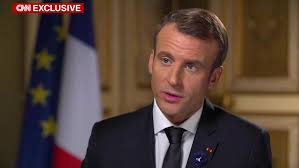Brève
Emmanuel Macron vient de jeter un gros pavé dans la mare. Depuis des décennies, le sempiternel appel lancé par les USA aux Européens pour que ceux-ci « prennent leur juste part du fardeau » en dépensant plus pour la défense, eut évidemment pour but sous-jacent d’écouler, sur un marché amical et captif, les produits de l’industrie militaire des Etats-Unis. Et voilà qu’aujourd’hui le président français dit : ça suffit.
Interviewé sur CNN, le président Macron n’y va pas par quatre chemins : « Je ne veux pas voir les pays européens augmenter leurs budgets de défense pour acheter des armes américaines ou autres, ou des matériels issus de votre industrie ». En d’autres termes, il adopte une position claire et nette en faveur d’une préférence européenne, la même approche qui prévaut depuis toujours aux Etats-Unis pour leurs propres produits militaires. Il faut dire que l’enjeu est de taille. Avec l’augmentation envisagée des budgets de défense européens à 2% du PIB, c’est 100 milliards de dollars supplémentaires qui risquent d’être ponctionnés sur les deniers publics de ce côté-ci de l’Atlantique, pour être redirigés vers les Etats-Unis.

(Crédit photo: CNN)
Il faut dire aussi qu’Emmanuel Macron ne fait que reprendre le raisonnement prôné par la France, plus ou moins discrètement, depuis des décennies. Et qu’il a, en plus du bon sens, tous les arguments - politiques, militaires, budgétaires - pour lui. Quant à la géopolitique, toute crédibilité sur la scène internationale suppose, d’abord et avant tout, la capacité de faire ses propres choix, indépendants, en matière de défense. Ce qui exige, à son tour, de ne pas être à la merci de quiconque en matière de fabrication et d’approvisionnement des moyens matériels de ladite défense.
Dans le domaine militaire, la divergence notable, entre Européens et Américains, dans leur « manière de faire la guerre » - différences doctrinales en termes d’usage de la force suffisante versus écrasante, de la priorité accordée à la protection des forces versus au contact avec les populations, de la place attribuée à la technologie etc. – plaide aussi pour des armements spécifiquement européens. Sur le plan budgétaire, des chercheurs britanniques du Royal United Services Institute (RUSI) avaient calculé il y a quelques ans qu’un contrat octroyé à un fabriquant du pays fait retourner, sous formes de taxes et d’assurances, plus d’un tiers du montant du contrat dans les trésors publics.
Les propos du président français sur CNN sont surtout un appel adressé à ses partenaires européens. En particulier après le récent choix, très contesté, de la Belgique d’acheter des avions F-35 américains. Car si les faits sont connus de tous, et si les gouvernements Européens n’arrêtent pas de mettre en avant les « progrès » de la défense européenne et l’impératif d’indépendance, les décisions ne suivent pas. Le PDG de Dassault n’avait pas tort quand il parlait d’une « une vraie volonté d’acheter américain quels que soient les prix, quel que soit le besoin opérationnel ». Sauf qu’il s’agit maintenant de décider au service de quels intérêts et de quels objectifs, les Européens ont l’intention de dépenser, à terme, 100 milliards de dollars supplémentaires chaque année.
***
D’autres articles de l’auteur sur le même sujet :
Europe européenne ou Europe atlantique : une question de «préférence»…
Les questions d’armement sous un éclairage transatlantique
Autonomie ou assujettissement : la dimension militaire de l'impératif de souveraineté européenne
Les politiques d’armement en Europe à travers l’exemple de l’affaire BAE Systems-EADS





















